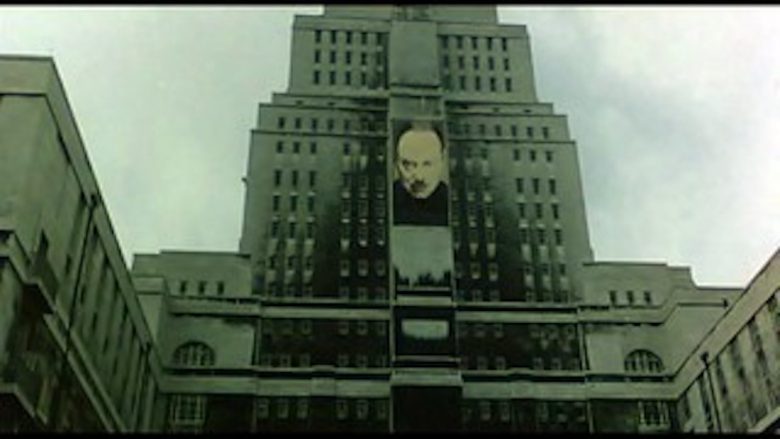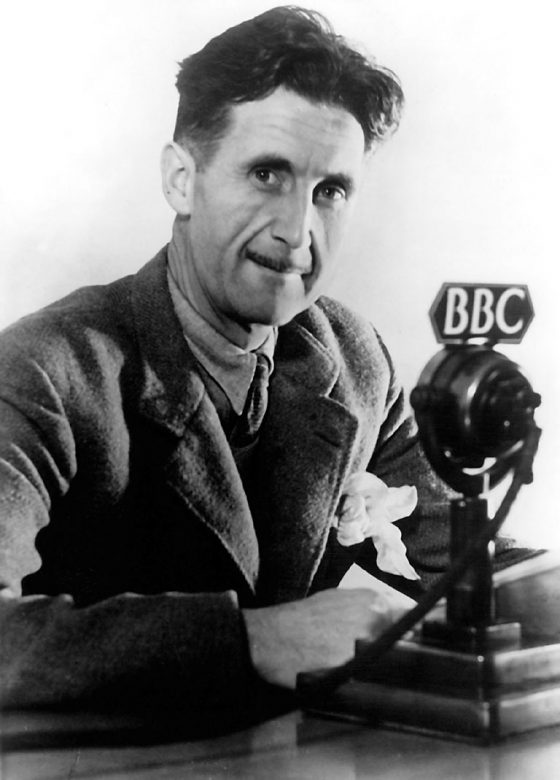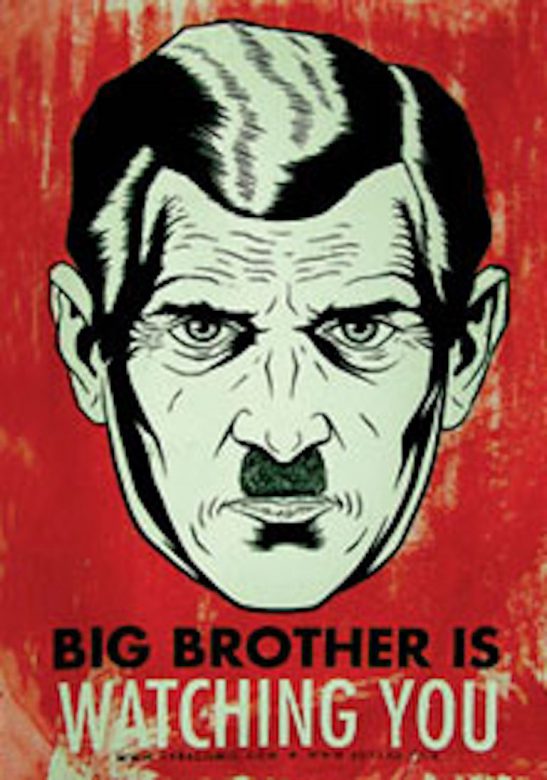When James Brown returned to George Orwell’s dystopia in an age of pervasive social media intrusion and a global pandemic, it felt a very different novel to the one he had read as a teenager.
When I first encountered Nineteen Eighty-Four in my teens, the Cold War was still icy, and we thought we knew what totalitarianism was.
Aspects of Orwell’s book are of their time, and in the 1970s the novel could appear dated. We knew that the energy totalitarianism diverted to repression doomed it to stagnation, and we in the west would out-compete and out-invent it. The economics of a total surveillance society in which everyone is constantly monitored and manipulated appeared self-defeating.
Lately, I revisited the novel in a world of social media, and systems that monitor online interaction and automatically tailor a response to each user; an era of seemingly constant wars, the rationale for which is seldom clear; and a period in which economic growth in western economies is routinely outstripped by China’s.
The idea that an economic-historical destiny favours free societies and punishes unfree ones, now seems less persuasive. Once it was possible to imagine that economic growth would improve everyone’s lot. The increasing inequality of many western societies threatens confidence in progress. There are threats to our liberties within our borders as well as beyond them, and some liberal democracies have proved particularly vulnerable to the Covid pandemic. The virus sometimes has an air of deliberately exploiting our internal divisions and weaknesses. In these circumstances, the novel has become prophetic once again.

Ministry of Truth (Senate House) with Big Brother banner. Credit Bill Lile
Tragedy and narrative form
The meaning of Nineteen Eighty-Four changes radically on a second reading. The reader is encouraged to identify with Winston, and when one first reads the story, the temptation is to see him as a dissident whose challenge to Big Brother’s regime has value, even though it fails. This sorts well with Orwell’s account in his essays of a humanist model of tragedy. However, in the novel Orwell took pains to challenge this kind of humanist and tragic reading.
Early in the book, Winston has a dream of his mother and sister being destroyed, while he survives:
He was out in the light and air while they were being sucked down to death, and they were down there because he was up here.
The zero-sum logic of his surviving at their expense anticipates the logic of the choice O’Brien will offer him in Room 101: he can save himself from the rats by offering Julia up to them instead. A few lines after Winston’s reflection on the deaths of his mother and sister, the impossibility of tragedy dawns upon him:
The thing that now suddenly struck Winston was that his mother’s death, nearly thirty years ago, had been tragic and sorrowful in a way that was no longer possible. Tragedy, he perceived, belonged to the ancient time, to a time when there was still privacy, love and friendship, and when the members of a family stood by one another without needing to know the reason.
The temptation on a first reading is to see Winston as, nevertheless, continuing to embody the possibility of Orwell’s brand of humanist tragedy. However, the book does not merely dispose of the possibility of Winston as a tragic hero in the end, but, on re-reading, can be seen to have eliminated the possibility of such a figure from the first.

George Orwell in the BBC 1940. Public domain.
The surveillance of dreams
From early in the novel, the narration often takes Winston as its centre of consciousness, and therefore easily modulates into Winston’s thoughts, blurring the distinction between Winston and the third-person and possibly omniscient narrator encountered at the outset. Once the third-person narration has started to be tinged with Winston’s subjectivity, as it is from the moment he begins his diary, the novel as a whole will be capable of moving between observing Winston from outside, and giving us seemingly privileged access to his inner thoughts.
In any other novel this would be unremarkable. But in this novel the position we are afforded as readers of being able to dip into Winston’s mind is not merely a literary convenience. It is the position occupied by O’Brien and the Thought Police. We may suppose, with Winston, that he has taken sufficient precautions to avoid being seen as he sits to write in an alcove not visible from telescreen. Yet it transpires that he had acquired the diary from a junk shop run by the Thought Police. On re-reading one has to assume the Thought Police knew the moment that he thought of starting a diary.
Though we are told from the first that the Thought Police maintain extensive surveillance, the full extent of their powers is spelt out only some way into the novel. In particular, Goldstein’s forbidden book (the one that O’Brien says he had a hand in writing) insists that scientists under the regime concentrate either on the science of killing or on mind-reading and mind-control:
The scientist of today is either a mixture of psychologist and inquisitor, studying with extraordinary minuteness the meaning of facial expressions, gestures and tones of voice, and testing the truth-producing effects of drugs, shock therapy, hypnosis, and physical torture; or he is chemist, physicist, or biologist concerned only with such branches of his special subject as are relevant to the taking of life.
The effects of this psycho-inquisitorial expertise may be felt throughout the story.
This is particularly true of dreams. The novel is preoccupied with dreams, implying an interest in subjective experience that qualifies Orwell’s usual objective realism. Several things start as Winston’s dreams or fantasies and then turn out to be real, such as the ‘golden country’ – the place to which Julia takes him at the beginning of their affair. He sees it so clearly in his dream that when he actually finds himself there, he knows for sure that there is water nearby. Similarly, for some time before he actually speaks with O’Brien, Winston imagines a relationship with O’Brien. Yet later O’Brien appears to know about Winston’s fantasies regarding himself, and even seems to acknowledge that he has participated in them, since he speaks of ‘the drama I have played out with you during seven years’. Accordingly, some of the communication between Winston and O’Brien appears to be quasi-telepathic.
Subjectivism and realism
This kind of ambiguous subjectivism is difficult to square with the element of realism in the novel. Realism can readily accommodate certain kinds of subjectivism – the kinds that come with using a key character as the narration’s centre of consciousness, for example. But a world in which things appear first in fantasy and only then in material reality is one in which the relation of subjectivism and realism has become unstable.
There has been a long-running debate about whether the novel abruptly shifts from being one kind of thing to another, particularly when Julia and Winston are arrested and pass into the Ministry of Love. However, there is a case for seeing the novel as well integrated, even if one has to re-read the first two parts with the revelations of the final part in mind in order to see how.
Doing so reveals a possible explanation for the seemingly anomalous subjectivist elements in the narrative. Those anomalies emerge where the boundary between an inner world of the mind and an objective outer world is transgressed. This is exactly the kind of transgression that the party’s mastery of psycho-manipulative technique and its capacity to rewrite the past at will entail. The result is a situation in which its official doctrine, as propounded by O’Brien in Part III, is a kind of subjective idealism. Hence O’Brien’s insistence that ‘reality exists in the human mind and nowhere else’. However, this kind of subjective idealism rests on a materialist foundation of scientific technique. The result may be philosophically incoherent, but in the world of the novel it is politically effective.
One might point to two things, among others, that in Orwell’s day looked as if they might contribute to the development of such mind-reading and -control. It is frustratingly hard to know exactly what psychological writings and doctrines Orwell knew. Passing references in essays and reviews point to some acquaintance with them (unsurprisingly, since his first wife, Eileen Shaughnessy, was studying psychology at UCL when they met in 1935 – [Crick]), but no more than that. Nevertheless, there were schools of psychology at the time, such as Soviet objective psychology, that could have lent themselves to the nightmarish project Orwell portrays.
Secondly, Oceania depends on data-processing and -reprocessing so sophisticated that they can override reality, and elements of this reprocessing, such as early computing and propaganda, existed in the 1940s. This overriding of reality is not merely what Winston suffers when, for example, O’Brien seeks to persuade him that two and two make five. It is also what he devotes his working life to inflicting on others. Though he struggles to recover the truth about his own family and origins, he is arguably better at falsifying the past than at finding out about it. Witness his delight in crafting the elaborate fiction of Comrade Ogilvy in order to help eliminate all trace of the ‘unperson’ Comrade Withers.
This total removal of someone from the historical record is essential to the party’s control. It is also another reason why tragedy in this world is impossible. As O’Brien explains to Winston, the party does not permit martyrs. It arrogates all the glamour of martyrdom to itself – at least, that is what it will do if one of the records of Comrade Withers is replaced, as Winston seeks to replace it, with the heroic death in battle of Comrade Ogilvy. The party’s vast campaign of political killing is essentially conceived as a kind of disease-control. No other meaning is allowed to attach to it. Death is no longer death, but a kind of erasure and a state of unbeing.

Big Brother Image Frederik Guimont (free art license)
‘Computers’
It is tempting to suppose that Orwell has intuited the kind of electronic data-processing that did exist in the last decade of his life, even though it was highly classified. However, at the time Orwell was writing computer signified a person who processed data (Agar). Winston is one such person. Julia, by contrast, is more like a modern IT engineer, tending a machine that does the actual work. Winston is still using some nineteenth-century IT, such as the pneumatic tubes that carry messages around the Ministry of Truth. He is an organic component of the ministerial machine for rewriting history.
The suspicion that can grow only on a second reading is that almost everything that happens to Winston, including all his impulses to overthrow the Party, are, from the Party’s point of view, foreseeable and already in the process of being dealt with at the outset of the story. Goldstein’s supposedly forbidden book speaks of the purges as a ‘necessary part of the mechanics of government’. Possibly, the disposal of Winston should be seen in the same light.
Notwithstanding his disillusionment with the regime, for much of the novel he remains committed to his work of elaborate falsification. It is work that is likely to lead to burn-out: covering up the past with elaborate falsifications both implies the existence of an historical truth and denies one access to it. The possibility of becoming drawn to trying to establish the truth one has helped to obscure is an occupational hazard the Party would be well-advised to look out for in its functionaries. A similar risk attends Julia’s work in Pornosec, supervising the mechanical production of narcotizing pornography: the risk of being affected by the material she helps to produce.
In retrospect, the dated photograph of Jones, Aaronson and Rutherford, torn from a copy of The Times, that turns up, seemingly by accident, in a bundle of papers sent to Winston in Minitrue, and that appears to prove they were innocent of the crimes to which they confessed, looks less like an accident than a test. O’Brien later knows all about it, and even produces a copy of the photograph, and then destroys it.
There is at least the possibility that the affair of Julia and Winston, so far from being a daring expression of inextinguishable humanity, is an upshot of the Party’s thrift in using two failing human components in its governmental machine to weed each other out. That each then sells the other out to save themselves in the zero-sum logic of Room 101 confirms Winston’s intuition that the tragic, and, with it, the humanism that Orwell associates with the tragic, have ceased to be possible.
The other possibility that some readers have noted about Julia is that she may be a member of the Thought Police. This is what Winston suspects at first. Evidence for this includes her furnishing Winston with a line from ‘Oranges and Lemons’. This is the nursery rhyme, whose attempted reconstruction by Winston symbolizes his attempt to recover the meaning of his childhood. The other two figures who supply him with missing lines are Charrington and O’Brien.
However, in a world in which subjectivity is so compromised, it is almost meaningless to ask whether Julia is ‘really’ a dissident or ‘really’ in the Thought Police. A similar question is raised in relation to O’Brien. Is he ‘really’ in the subversive Brotherhood, or ‘really’ loyal to the Party? Is he duping Winston and Julia when they come to his flat to join the Brotherhood? His forecast of the consequences of membership for them proves fairly accurate. Many readers assume that we know that O’Brien is ‘really’ a torturer for the regime. But the ambiguity of his relationship with Winston reflects the extent to which questions about where people’s loyalties really lie have become meaningless. In a world in which people are components in a system what matters is how they function, not who they are.
Conclusion
The quasi-modernist, subjectivist elements of the novel, however anomalous they might appear to be at first, make a kind of realist sense as soon as one realises that the novel’s plunge into psychodrama and symbolism may not be a shying away from realism that implies a world other than the world controlled by the party, but a plunge precisely into areas of life over which the party exercises its most sophisticated and remorseless control. For if O’Brien appears uncannily capable of reading Winston’s mind that is the result of scientific technique.
When the narrator announces that ‘nothing was your own except the few cubic centimetres inside your skull’ it might seem, on a first reading of the novel, to be a bleakly authoritative verdict delivered by an omniscient narrator. But on a second reading one has to suspect that this is Winston’s sentiment, and a fateful instance of his self-deception. The party’s control over material production may be fitful. This is not, however, because it is incompetent, but because it has invested its efforts in a different project, one that ensures that the few cubic centimetres inside Winston’s skull are the last thing he can claim as his own.
Dr James Brown is an Associate Research Fellow at Birkbeck University of London, and joint co-ordinator of the Guilt Group.
This blog summarises a case that will be published as an article in due course. I am grateful to Daniel Pick and the Hidden Persuaders project for inviting me to write it, to Simon Jarrett for deft editorial advice, and to the members of the Guilt Group, especially Sam Ashenden and Thomas Docherty, for constructive observations and suggestions.
Works cited
Agar, Jon (2003). The Government Machine: A Revolutionary History of the Computer. Cambridge, MA: MIT Press.
Crick, Bernard [1980] (1982). George Orwell: a life. Harmondsworth: Penguin.
Orwell, George [1949] (2013). Nineteen Eighty-Four, The Annotated Edition. ed. D. J. Taylor and Peter Davison. London, Penguin.



